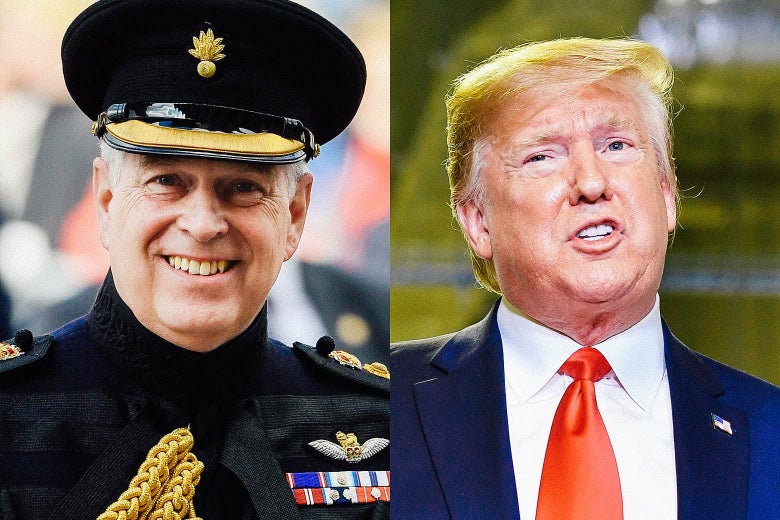
Prince Andrew, Donald Trump.
Photos by John Thys/AFP via Getty Images, Mandel Ngan/AFP via Getty Images
Prince Andrew is awful and self-righteous and dim. That much seems clear, and the story of his association with Jeffrey Epstein seems likely to get worse: There are rumors that Prince Andrew will be asked to talk to U.S. law enforcement agencies about Epstein. Johanna Sjoberg has accused Andrew of groping her at Epstein’s home. A BBC interview with Andrew’s main accuser, Virginia Roberts Giuffre, will air on Monday, in which she describes the “really scary time” in her life. Prince Andrew’s now-notorious BBC interview was, his assurances to his mother the queen notwithstanding, a disaster. Within days, the royal family forced him to step down, and he’s had to move his offices out of Buckingham Palace. The Royal Philharmonic Orchestra has severed ties with him. Queen Elizabeth even canceled his birthday party.
For Americans, this is disorienting, maybe even mesmerizing. On the one hand, the squalid, casual abuse of which Prince Andrew stands accused is horribly familiar: There’s a pattern of rich and powerful men preying on weaker parties in this country, and at the highest levels of leadership. On the other hand, it’s astonishing to witness a man of that stature facing discipline and expulsion from a power structure that includes members of his literal family. That’s unimaginable here (imagine one Trump disciplining another!). However laughably light Andrew’s “punishments” might seem—the man is still a millionaire several times over, has lived a life of immense privilege, and doesn’t seem to be in imminent danger of (for example) going to prison—he is disgraced. And he lives in a social world where disgrace must actually sting. Americans don’t live in that society. Even Harvey Weinstein is now being invited to events, and those who object are being kicked out. Prince Andrew has been ostracized (by the British public and the press) and yet Donald Trump still enjoys wide support from his base; despite many credible accusations of assault, his supporters blame the women he allegedly abused. This might partly explain why Americans remain so fascinated by the royals: They seem to be the one kind of world-famous celebrity for whom strict standards of conduct and restraint are even notionally enforced.
If you’ve watched Netflix’s The Crown, which dramatizes the long life of Queen Elizabeth II, you’ve seen that show thematize, time and again, how the monarch’s work has been to strip herself of her individuality in order to better serve the office: The queen functions as the ultimate anti-Trump. She was not, except under the strictest, most controlled circumstances, to express preferences or opinions. The office required a studied, careful neutrality, and this became all the more important as the Crown’s real power diminished. When commitment to that principle flagged—whenever a royal let himself be guided more by personal inclinations than duty—disaster struck. The royal scandals the show covers are quite minor, but they have outsize consequences: King Edward VIII abdicated the throne in order to marry Wallis Simpson, who’d married too many times to be queen. Princess Margaret was not allowed to marry a divorced man, so she married one who had affairs, and had a few of her own.
By the time Charles and Diana came along, the sex scandals got uglier and their consequences messier. But the royal family was clinging desperately to its soft power, and it did so by trading on the one thing it had that other celebrities didn’t: the veneer of intense respectability.
That veneer is crumbling. It’s not exactly a secret that the royal family is punishing Andrew because of his bad press, not his bad actions, accounts of which surfaced as long ago as 2015. Prince Charles, Vanity Fair reported, “has stayed silent about the interview, but multiple reports have emerged that he was less than pleased about his trip being overshadowed in the headlines.” According to Fox News, he’s angry that his environmental-awareness tour “has been completely overshadowed by the 59-year-old’s scandal impacting the British royal family.”
These are petty concerns, and yet they’ve produced a desirable result: A bad man who associated with horrifying people has lost things that mattered to him. Someone enforced a consequence. The queen might still be on his side—Andrew is reportedly her favorite, and she went horseback riding with him the day after his resignation—but the pomp and circumstance on which so much of his self-image depended has been taken from him. He is in disgrace in a world where disgrace is still a category.
The United Kingdom and the United States bear striking similarities. When it comes to hard politics, both governments are currently led by oddly coiffed misogynistic leaders whose fans love them for their misconduct, dishonesty, and lack of impulse control. But the royal family is different: It still at least notionally aspires to standards political leaders seem to have abandoned. Americans watch the royals, rapt, for signs of slippage and failure, but also out of a kind of awe at how long they’ve sustained the illusion of honor. Yes, they’re mooches and hypocrites, but—as my colleague Ben Mathis-Lilley has written—maybe hypocrisy is better than the alternative.
Readers like you make our work possible. Help us continue to provide the reporting, commentary and criticism you won’t find anywhere else.
Join Slate Plusfrom Slate Magazine https://ift.tt/37RoQKH
via IFTTT
沒有留言:
張貼留言